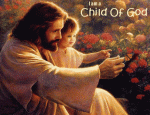
Child of God
I am so glad that God has adopted me. Jesus has broken the bondage of slavery and given my His Holy Spirit. I am a child of God. I have a heavenly Father. I have a family. Now that is some very good news!
Because you are sons, God has sent forth the Spirit of His Son into our hearts, crying, “Abba! Father!” | Galatians 4:6
This spirit of slavery was rampant within the Jewish culture when Jesus came to earth. He soundly rebuked the religious leaders for instilling such legalism in people with whom God desired to have a loving relationship.
Paul cautioned the early churches to be watchful for the return of that spirit of slavery. In Galatians 5:1 he wrote,
It is for freedom that the Messiah has set us free. Stand firm, then, and do not let yourselves be burdened again by a yoke of slavery.
In startling contrast is the Spirit of adoption, the Holy Spirit of God who brings us into God’s family. Jesus invited believers to address God as “our Father” (Matthew 6:8–9).
God explained His desire to treat His people as sons and daughters (2 Corinthians 6:18).
Or what agreement has the temple of God with idols? For we are the temple of the living God; just as God said,
“I will dwell in them and walk among them;
And I will be their God, and they shall be My people.
“Therefore, come out from their midst and be separate,” says the Lord.
“And do not touch what is unclean;
And I will welcome you.
“And I will be a father to you,
And you shall be sons and daughters to Me,”
Says the Master Almighty.
- God has made this spiritual adoption possible through faith in His only begotten Son, Jesus the Messiah. I am a child of God. That is very good news.
- Based on our faith and confession of allegiance, God adopts us into His eternal family.
- He makes us joint heirs together with Jesus the Messiah.
- We receive the Spirit of adoption when we accept, by faith, the grace that has been offered to us in the Messiah.
- It is the Spirit of adoption who teaches us to call out to God as our “Abba, Father.”
Reblogged this on Talmidimblogging.
LikeLiked by 1 person
Good post
LikeLiked by 1 person
Pingback: Fellowship over meals | Belgian Biblestudents - Belgische Bijbelstudenten
Pingback: Jews have the Ultimate Support System – Jeshuaisten / Jeshuaists